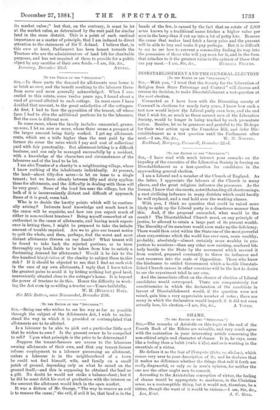[To THE EDITOR OF THE "SPECTATOR. "] SIR,—Being one who wishes
to see his way as far as possible through the subject of the Allotments Act, I wish to under- stand the way in which it is provided or contemplated that allotments are to be allotted.
Is a labourer to be able to pick out a particular little spot that he wishes to own ? Is the present owner to be compelled to sell ? Upon what principle is the price to be determined ?
Suppose the tenant-farmers are averse to the labourers owning allotments of their own, and that any tenant-farmer refuses employment to a labourer possessing an allotment, unless a labourer is in the neighbourhood of a town he could not feed himself, wife, and family on a small patch of ground, depending only on what he raised on the ground itself,—and this is supposing he obtained the land as a gift. No doubt he would not strike a balance-sheet ; but if he did he must debit his cost of production with the interest on the amount the allotment would fetch in the open market.
It was a dictum of Mr. George, " The way to remove an evil is to remove the cause;" the evil, if evil it be, that land is in the hands of the few, is caused by the fact that an estate of 2,000 acres known by a traditional name fetches a higher value per acre in the lump than if cut up into a lot of petty lots. Remove the cause that makes land fetch a fancy price and the peasant will be able to buy and make it pay perhaps. But it is difficult to me to see how to prevent a commodity finding its way into the possession of those who will pay most for it, and in the form that attaches to it the greatest value in the opinion of those that
can pay most.—I am, Sir, &c., IIURRELL FROUDE.


































 Previous page
Previous page